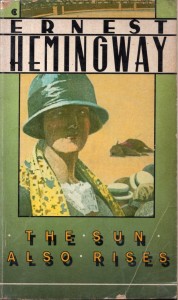As mentioned in my earlier post, the opening of Endless Love by Scott Spencer enraptured me and I was eager to finish reading it. I thought I’d also compare the novel to the 1981 Brooke Shields film. A re-make opens in a couple weeks.
The first thing that struck me was Spencer’s discipline as an author. This is a 400-page arrow of a novel that never strays from the mark of David’s passion. It’s a novel about first love and how its flames can (literally) engulf and destroy everything around it, alter lives forever, and drive one to madness. Spencer accomplishes an amazing feat by getting the reader to share David’s yearning for Jade. He does this with skills comparable to those of a talented seductress. He teases, gives us glimpses, leaves us writhing for more. In fact, David’s Jade appears in only a few flashback scenes early in the novel. We glimpse her only briefly, we see David yearning for her and plotting to see her, and we feel his desperation, but it will be nearly 300 pages before we actually get to consummate our love affair by meeting Jade in person. A lesser writer would be inclined to spend those hundreds of pages trying build up a love affair by showing endearments, hand-holding beneath the stars, flowers, dances, and kisses… which would make for a boring novel. Spencer cuts straight to the core of “first love” in part by realizing that the “love” itself is cliché, but the mad, all-consuming passion surrounding it is what is compelling.
So after the opening pages, David is in a mental hospital by court order for arson. What’s driven him crazy is that he was rejected not only by Jade, but by her entire family. They had taken him in. He lived under their roof. They shared everything together; they were an eccentric, but very close family. Then suddenly they pushed him away, with no explanations. He was injured not only by the loss of his first love, but by the rejection from the rest of the family. After the fire, their family split up and spread across the country. This becomes an ongoing theme of the novel, of how David’s all-consuming first love can destroy everything in its path, including David’s own life and well-being.
The themes and imagery motifs are well-constructed and carefully woven into the narrative. The most pervasive and powerful motifs revolved around hearts, blood, and flames, and there are many subtle word choices, descriptions, and images that keep this playing at the back of the reader’s minds (like Jade, in frustration, poking at her car’s cigarette lighter, or white snow behind a car turning the color of ash from the exhaust). Endless Love is the definitive novel of first love, and a true tour-de-force.
About the film, I will say that I don’t envy anybody trying to adapt this novel for the screen. The first challenge is the structure; while it works on paper to have David yearning for Jade for the first 75%, before the reader really gets to see them together, you couldn’t expect a filmmaker to withhold Brooke Shields until the last 20 minutes of the film. David’s yearning in the novel is created by the interiority of his first person narrative; rather than trying to replace this with voice-overs and flashbacks, the filmmakers tried to impose a traditional arc on the story. Shortcuts had to be made, and the most tragic of these cuts was that David and Jade never get a period of reunion; they are instead thrust straight past any period of redemption or hopefulness to the next plot point. And ultimately the filmmakers were powerless to the rising star-power of Brooke Shields, and they tried to twist the story so that the final moral of the story is hers to learn. Suddenly it’s a story of how Brooke Shields’ character needs to mature and become a woman—which has nothing to do with the thrust of the novel (although Jade does mature in the novel, it happens “behind the scenes”). In short, all the powerful metaphors for first love in the novel become a disjointed string of pointless mishaps on the screen.

